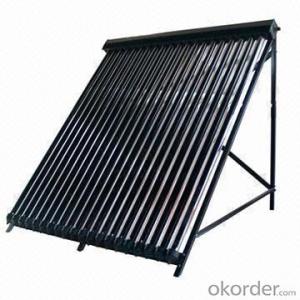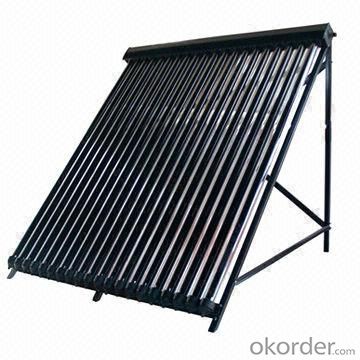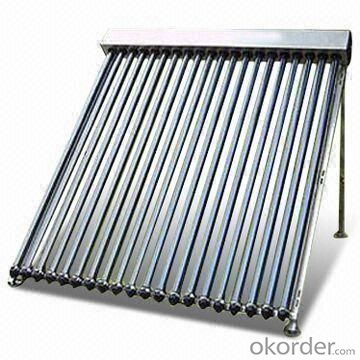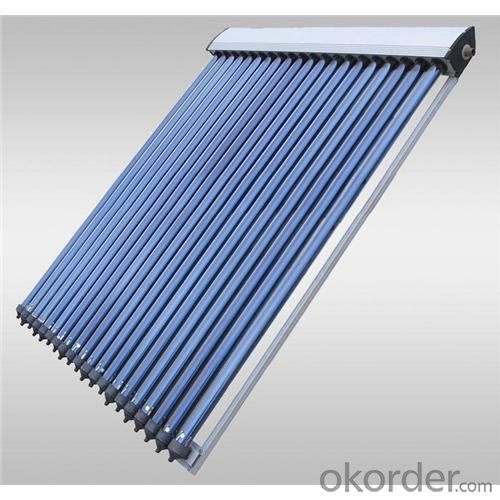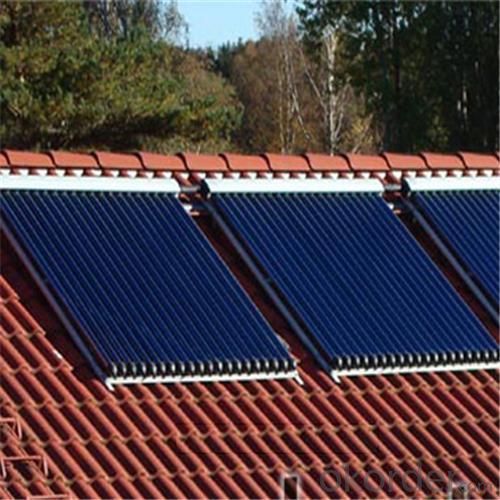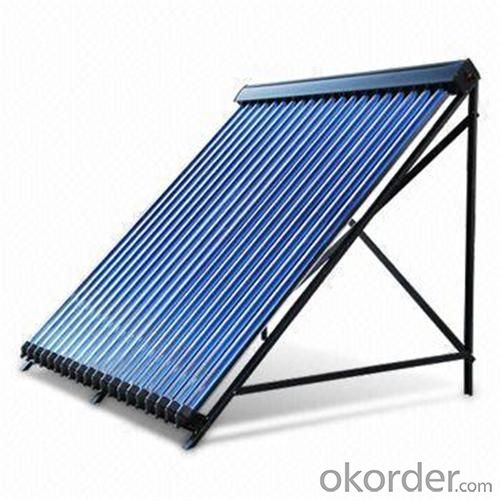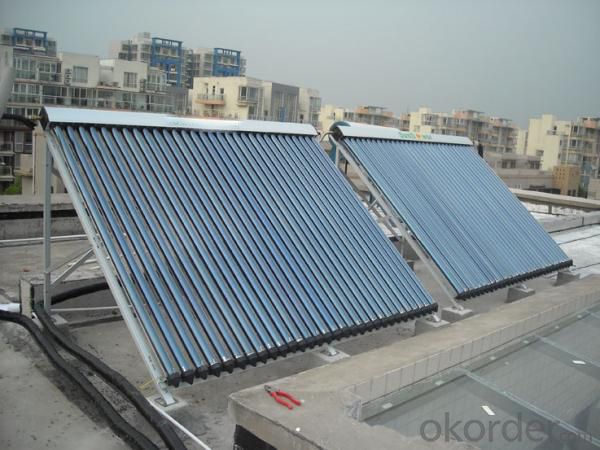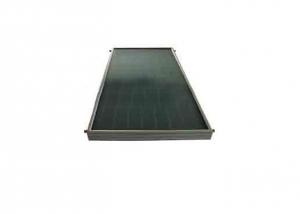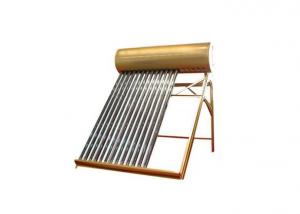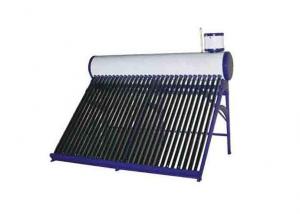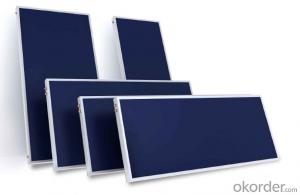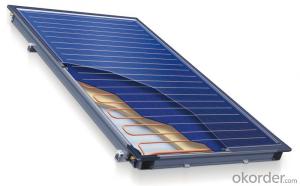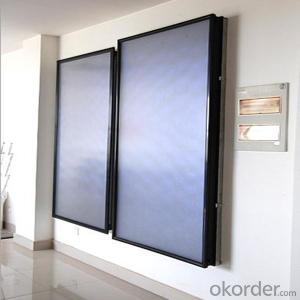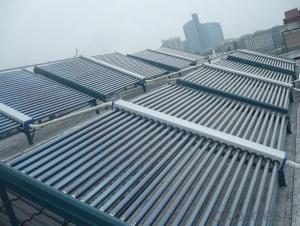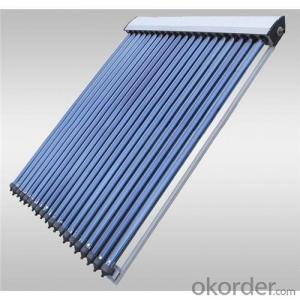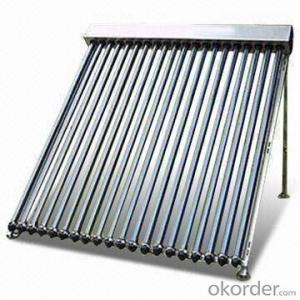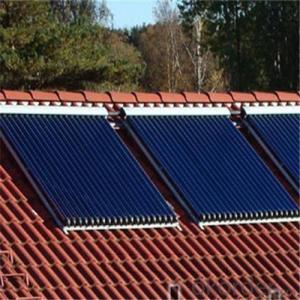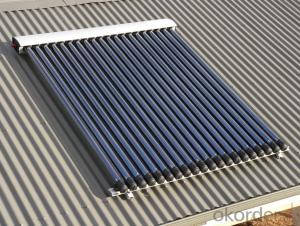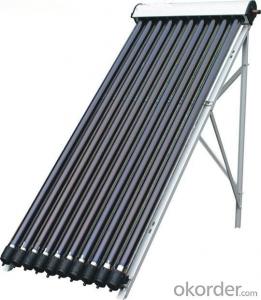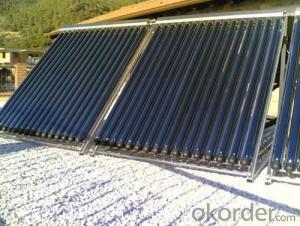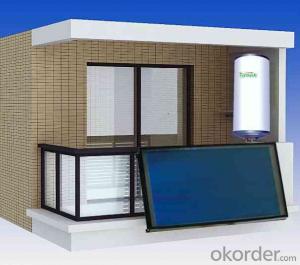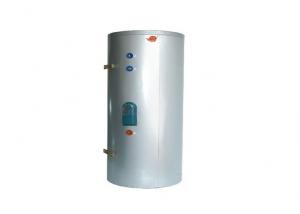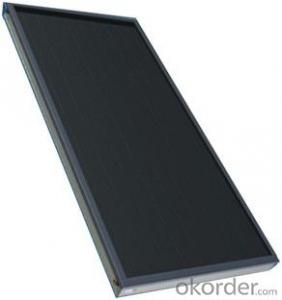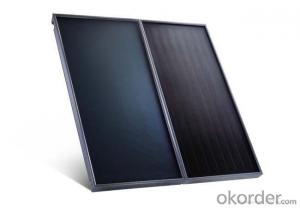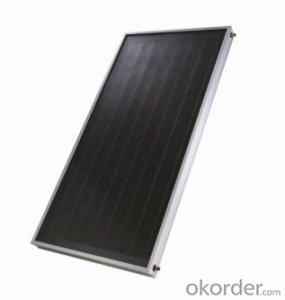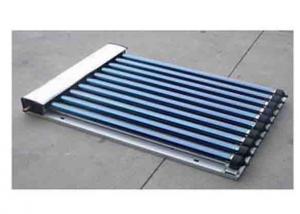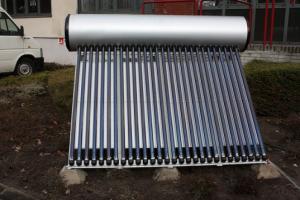Original Solar Collectors - Rooftop Economical Vacuum Tube
- Loading Port:
- China main port
- Payment Terms:
- TT OR LC
- Min Order Qty:
- 5 set
- Supply Capability:
- 10000 set/month
OKorder Service Pledge
OKorder Financial Service
You Might Also Like
Specifications
manifold (inner) | red copper |
manifold (exterior) | aluminum alloy |
glass tube dimensions | 58mm * 1800mm |
daily efficiency | ≥55% |
heat preservation | 72 hours |
hail resistance | 25mm |
max pressure | 7 bar |
coating of vacuum tube | ALN/AIN-SS/CU |
heat pipe | anti-freezing > -35 degree |
certificate | Solar Keymark, EN12975,SRCC |
Serious Product
Models | L*W*H mm | Vacuum tube | Power output | Efficiency | Header mm | Frame | container loading 20FT/40HQ sets | Gross Weight kg |
SHC-8 | 1917*910*133 | 58*1800*8pcs | 939W | 0.668 | Φ35/1.0 | AL alloy | 185/445 | 27 |
SHC-10 | 1917*1130*133 | 58*1800*10pcs | 1189W | 159/385 | 33 | |||
SHC-12 | 1917*1350*133 | 58*1800*12pcs | 1440W | 149/358 | 40 | |||
SHC-15 | 1917*1680*133 | 58*1800*15pcs | 1815W | 120/290 | 49 | |||
SHC-18 | 1917*2010*133 | 58*1800*18pcs | 2191W | 100/242 | 59 | |||
SHC-20 | 1917*2230*133 | 58*1800*20pcs | 2442W | 87/210 | 66 | |||
SHC-22 | 1917*2450*133 | 58*1800*22pcs | 2692W | 83/202 | 72 | |||
SHC-24 | 1917*2670*133 | 58*1800*24pcs | 2943W | 77/188 | 79 |
Packaging & Delivery
Packaging Details: | Exporting Carton with big foaming protection |
Delivery Detail: | In 10-15 days |
Loading Quantity
Model | Tube | Tube Q.T.Y | Loading Q.T.Y/40HQ |
GSC15 | 58*1800mm | 15pcs | 315sets |
GSC18 | 58*1800mm | 18pcs | 265sets |
GSC20 | 58*1800mm | 20pcs | 248sets |
GSC22 | 58*1800mm | 22pcs | 225sets |
GSC25 | 58*1800mm | 25pcs | 200sets |
GSC30 | 58*1800mm | 30pcs | 168sets |
Principle of solar collector:
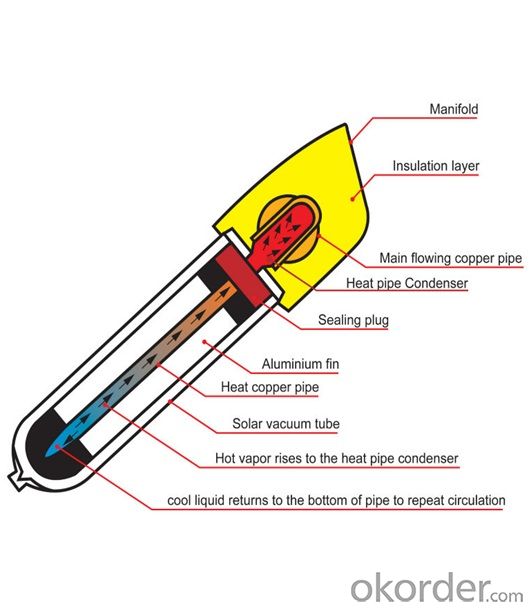
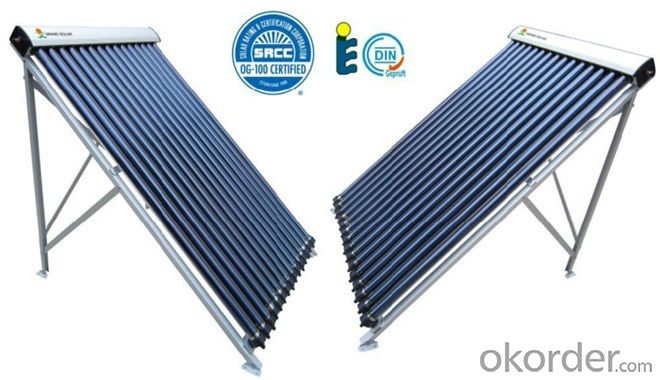
Solar collector details
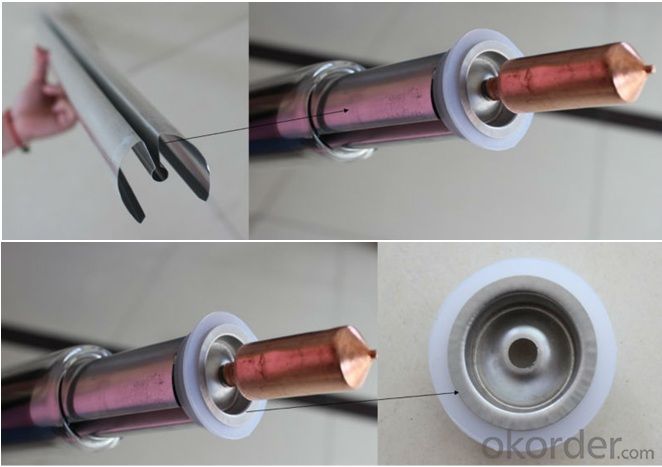
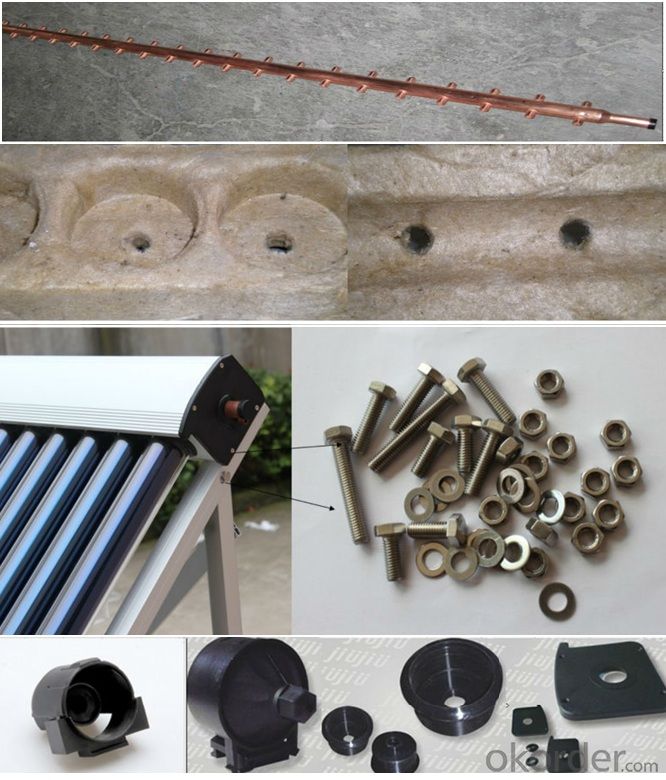
- Q: Can solar collectors be used for heating greenhouses?
- Yes, solar collectors can be used for heating greenhouses. Solar collectors, such as solar water heaters or photovoltaic panels, can capture the sun's energy and convert it into heat or electricity, respectively. This energy can then be used to warm the greenhouse, providing a sustainable and cost-effective heating solution.
- Q: Can solar collectors be used for heating laboratories?
- Yes, solar collectors can be used for heating laboratories. Solar collectors, such as solar thermal systems or solar water heaters, can harness the energy from the sun to heat water or air which can then be used for heating purposes in laboratories. This renewable energy source can be an effective and sustainable solution for heating laboratories while reducing dependence on traditional fossil fuels.
- Q: Can solar collectors be used for heating agricultural buildings?
- Yes, solar collectors can be used for heating agricultural buildings. Solar thermal collectors can capture and convert sunlight into heat energy, which can be used to warm up agricultural buildings such as barns, greenhouses, or storage facilities. This can help maintain optimal temperatures for livestock, crops, or equipment, leading to increased productivity and energy efficiency in agricultural operations.
- Q: How much space is needed to install a solar collector?
- The space needed to install a solar collector can vary depending on the size and type of collector being used. Typically, a residential solar collector for heating water or generating electricity would require an area of around 100-250 square feet. Commercial or larger-scale solar collectors may require much larger spaces, sometimes spanning several acres.
- Q: Can solar collectors be used in areas with limited sunlight?
- Yes, solar collectors can be used in areas with limited sunlight. While solar collectors are most efficient in areas with abundant sunlight, they can still generate electricity or heat in areas with limited sunlight. However, the overall energy output may be lower in such areas compared to regions with more sunlight. Additionally, the design and positioning of the solar collectors need to be optimized to make the most out of the available sunlight.
- Q: Can solar collectors be used for heating airports and transportation hubs?
- Yes, solar collectors can be used for heating airports and transportation hubs. Solar thermal systems can be installed to collect and convert solar energy into heat, which can then be used for space heating, water heating, and other heating applications in these facilities. By utilizing solar collectors, airports and transportation hubs can reduce their reliance on traditional fossil fuels and decrease their carbon footprint.
- Q: Can solar collectors be used for greenhouse heating?
- Yes, solar collectors can be used for greenhouse heating. Solar collectors, such as solar thermal panels, can absorb sunlight and convert it into heat energy, which can then be used to warm up the greenhouse. This sustainable heating method can help maintain optimal temperatures for plant growth and reduce reliance on traditional heating systems.
- Q: How do solar collectors affect the overall energy efficiency of a building?
- Solar collectors can significantly improve the overall energy efficiency of a building. By harnessing the power of the sun, solar collectors can generate clean and renewable energy, reducing the reliance on traditional fossil fuels. This reduces the carbon footprint of the building and helps combat climate change. Solar collectors convert sunlight into thermal energy, which can be used for various purposes, such as heating water or providing space heating. This reduces the need for conventional heating methods, which often rely on non-renewable energy sources. As a result, solar collectors can significantly lower energy consumption and decrease utility bills. The integration of solar collectors into a building's energy system also increases its energy independence. By generating their own clean energy, buildings can become less dependent on the grid, especially during peak demand periods. This leads to increased resilience and reliability of the building's energy supply. Furthermore, solar collectors are typically installed on the roof or facade of a building, utilizing previously unused space. This dual-purpose approach allows for efficient use of land or rooftop areas, making them ideal for urban environments with limited space. Additionally, solar collectors can also act as passive shading devices, reducing the need for air conditioning in warmer climates. Overall, solar collectors have a positive impact on the energy efficiency of a building. They reduce greenhouse gas emissions, lower energy consumption, decrease reliance on the grid, and make efficient use of available space. By harnessing the power of the sun, solar collectors contribute to a more sustainable and environmentally friendly building design.
- Q: Can solar collectors be used for generating electricity on military bases?
- Solar collectors are indeed capable of generating electricity on military bases. Many military bases worldwide have already implemented solar power systems to produce clean and renewable energy. Solar collectors, also referred to as solar panels or photovoltaic (PV) systems, convert sunlight into electricity using the photovoltaic effect. This technology can be easily integrated into military bases, offering a reliable and sustainable power source. There are multiple reasons why solar collectors are well-suited for military bases. Primarily, solar power reduces dependence on traditional fossil fuels, enhancing energy security and reducing vulnerability to supply disruptions. This is especially crucial for military operations that require a constant and uninterrupted power supply. Moreover, solar collectors are cost-effective in the long term. Although the initial installation costs may be higher compared to conventional energy sources, solar power systems have a long lifespan and require minimal maintenance. This makes them financially appealing for military bases operating on limited budgets. Solar collectors also provide environmental benefits. By generating electricity from the sun's energy, military bases can significantly decrease their carbon footprint and contribute to global efforts to combat climate change. Additionally, solar power systems produce no emissions or noise pollution, ensuring a cleaner and quieter environment for military personnel and nearby communities. In terms of practicality, solar collectors can be installed on various surfaces within military bases, including rooftops, parking lots, or open fields. They can also be integrated into existing infrastructure, reducing the need for additional land or space. Additionally, advancements in solar technology have made it possible to generate electricity even in suboptimal weather conditions, ensuring a reliable power supply regardless of the climate. In conclusion, solar collectors are a feasible and advantageous choice for generating electricity on military bases. They provide a sustainable, cost-effective, and environmentally friendly power source, enhancing energy security and reducing reliance on fossil fuels. By embracing solar power, military bases can contribute to a more sustainable future while meeting their operational and energy needs.
- Q: Can solar collectors be used for heating mines?
- Yes, solar collectors can be used for heating mines. Solar thermal systems can be installed to capture and convert sunlight into heat energy, which can then be used to warm up the mines. This can be a cost-effective and environmentally friendly alternative to traditional heating methods, reducing reliance on fossil fuels and lowering carbon emissions.
Send your message to us
Original Solar Collectors - Rooftop Economical Vacuum Tube
- Loading Port:
- China main port
- Payment Terms:
- TT OR LC
- Min Order Qty:
- 5 set
- Supply Capability:
- 10000 set/month
OKorder Service Pledge
OKorder Financial Service
Similar products
Hot products
Hot Searches
Related keywords
